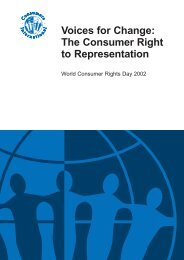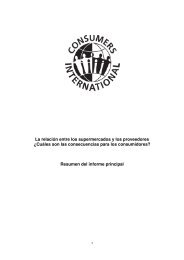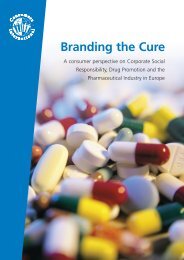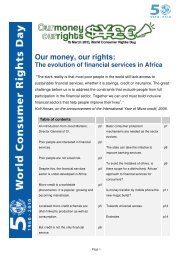The remittances game of chance: playing with loaded dice? January ...
The remittances game of chance: playing with loaded dice? January ...
The remittances game of chance: playing with loaded dice? January ...
Create successful ePaper yourself
Turn your PDF publications into a flip-book with our unique Google optimized e-Paper software.
Introduction<br />
“You put your money in and take your <strong>chance</strong>s …<br />
How much money comes out at the other end depends on what kinds <strong>of</strong> fees and what kinds <strong>of</strong><br />
exchanges have been added in -- things that are not necessarily exposed to the client up front.”<br />
Elizabeth Warren<br />
White House Special Adviser<br />
Washington, 22 October 2010<br />
“Competition is not only the basis <strong>of</strong> protection to the consumer, but is the incentive to progress.”<br />
Herbert Hoover<br />
31st President <strong>of</strong> the United States<br />
Worldwide, over USD400 billion is sent home by migrant workers every year, USD325 billion to<br />
developing countries. 1 This money is used to support education, build homes and provide the day-today<br />
essentials for millions <strong>of</strong> families. But many <strong>of</strong> the consumers who send money home are paying<br />
high, and sometimes extortionate, rates for transferring their money internationally. Although progress<br />
has been made in reducing costs between some countries, consumers are still routinely charged<br />
more than 10%, and in some cases more than 20% to send their money home. 2 Taken in the<br />
aggregate, these sums amount to billions <strong>of</strong> dollars annually. <strong>The</strong> World Bank estimates that a fivepoint<br />
price reduction in remittance costs could result in USD15 billion saved annually for immigrants<br />
and their families. 3<br />
This situation is not only a consumer protection issue, but also a question <strong>of</strong> social justice. As a direct<br />
result <strong>of</strong> these high prices, the consumer has less discretionary capital available for savings or<br />
investing in the host country. <strong>The</strong> migrant’s family abroad has substantially less for consumption <strong>of</strong><br />
food, clothing and medicines.<br />
In contrast to the low incomes <strong>of</strong> many <strong>of</strong> their customers, market leaders, Western Union and<br />
MoneyGram, earned USD1.4 billion 4 and USD310 million 5 respectively in the second quarter <strong>of</strong> 2011 -<br />
an increase in pr<strong>of</strong>its <strong>of</strong> 7% and 15% respectively based on the previous year’s Q2 earnings.<br />
Why are consumers paying such high charges? <strong>The</strong> reasons vary from one country to another, but<br />
three themes are clear: a lack <strong>of</strong> real choice, a lack <strong>of</strong> transparent pricing and a lack <strong>of</strong> accessible<br />
information for consumers.<br />
Too <strong>of</strong>ten, remittance consumers face numerous obstacles to getting a fair deal. <strong>The</strong>y need the<br />
investigative skills <strong>of</strong> a CSI detective to compare adequately the prices <strong>of</strong>fered by different moneytransfer<br />
companies (MTCs). Additionally, the preferred MTC should be conveniently located both for<br />
the consumer to send the funds, as well as for the recipient who may well be located in a rural area <strong>of</strong><br />
a developing country. Bank accounts and internet access may also be required to access the best<br />
deals. And despite all their efforts, they may still find that fair deals are just not out there in a market<br />
that is <strong>of</strong>ten remarkably uncompetitive. This is asking a lot from any consumer, let alone one who may<br />
be relatively new to the country.<br />
However, there is evidence that these high prices and unfair practices can be challenged. Highvolume<br />
corridors benefit from economies <strong>of</strong> scale as well as attracting niche providers, which<br />
specialise solely in this corridor adding to its competitiveness. In addition, they have also <strong>of</strong>ten been<br />
the subject <strong>of</strong> significant international attention, and where the most research exists, such as in the<br />
USA to Latin American corridor, prices and options available to the consumer appear to be more<br />
favourable.<br />
In contrast, prices in lower-volume and less-researched corridors, such as those communicating <strong>with</strong><br />
Africa, tend to be significantly higher. For example, in the first quarter <strong>of</strong> 2011, according to the World<br />
4







![pkef]Qmf eg]sf] s] xf] < - Consumers International](https://img.yumpu.com/6479658/1/184x260/pkefqmf-egsf-s-xf-consumers-international.jpg?quality=85)